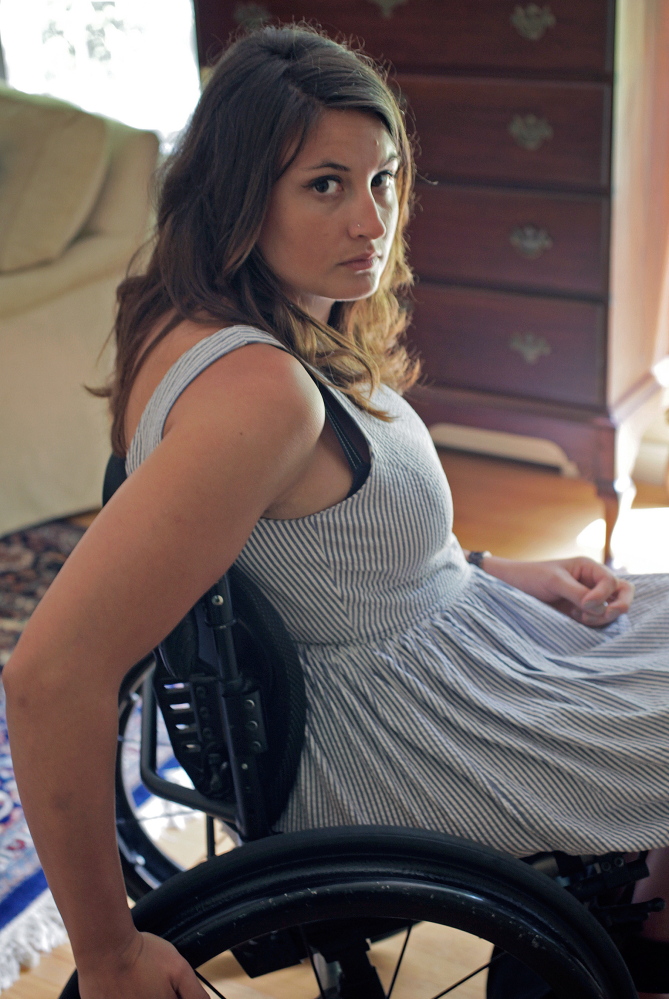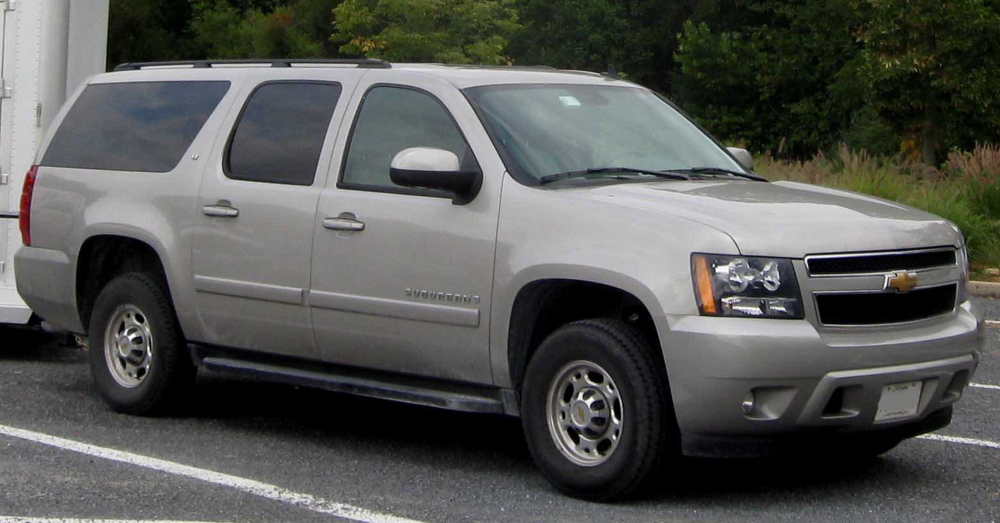YARMOUTH — Emma Verrill didn’t know that the heated seat in the back of her friend’s Chevrolet Suburban had been turned on until she awoke the next day in 2012 to find a blister the size of her palm on her skin.
Verrill, who is paralyzed from the waist down and can’t feel hot and cold in the lower half of her body, suffered a third-degree burn on her buttocks that was so serious it required surgery and months in bed to heal.
Verrill, 26, is now suing General Motors, the legally troubled maker of the Suburban she had been riding in, seeking to hold the company liable for her injury. In a complaint filed on her behalf last month in U.S. District Court in Portland, she accused the automaker of negligence for failing to adequately test the rear seat heaters in the Suburban to prevent them from reaching “dangerously high temperatures that would burn human flesh.”
Verrill has been paralyzed since she underwent a spinal operation that went terribly wrong in 2003, when she was a 15-year-old sophomore at Yarmouth High School. She will need a wheelchair for the rest of her life.
She said she couldn’t feel that the seat heater in her friend’s 2008 Suburban had somehow been switched on and gotten so hot that it seared her skin. It was a warm day on June 28, 2012, as she and her friend were driving from New York City through Connecticut, so there was no reason the heater would be on.
“I have very limited sensation. I have touch sensation, but I don’t have temperature sensation. So if water is too hot or if something is too cold, I can’t tell. Because of that, my body can tell me in other ways if there is something that isn’t really right. And I just knew that something was wrong,” Verrill said.
Beneath the blister, Verrill’s skin was badly scarred, she learned during a series of hospital visits after the injury. A doctor had to remove a section of skin from her upper left thigh to graft in place of the burned flesh.
Verrill’s lawsuit comes as General Motors has been repudiated nationally for serious safety defects in other vehicle models.
In 2014 alone, General Motors has recalled more than 20 million vehicles. The company issued nearly all of those recalls after first recalling 2.6 million older Chevrolet Cobalts and similar cars with defective ignition switches that have been tied to dozens of crashes and at least 13 deaths.
None of those recalls involved heated seats in General Motors’ Suburban line, one of its largest sport utility vehicles. The National Highway Traffic Safety Administration has not received any consumer complaints about the vehicles’ seat heaters, said José Alberto Uclés, a spokesman for the government agency.
Clarence Ditlow, executive director of the nonprofit Center for Auto Safety, said the consumer advocacy group also has no records of recalls or lawsuits related to seat heaters in the Suburban line.
There were 144 model year 2008 Chevrolet Suburbans registered in Maine as of June 2014, according to the state Bureau of Motor Vehicles.
General Motors has filed a court response denying Verrill’s claims. In the nine-page filing, GM denied the seat heater was defective or dangerous, denied it caused Verrill’s injury and denied knowledge of a defect or failure to fix a defect.
U.S. Magistrate Judge John Rich III has issued a scheduling order telling both sides to be ready for trial by May 4, 2015.
After being burned, Verrill spent nearly three months bedridden at her childhood home in Yarmouth, entirely dependent on her parents, Anne and Jeff Verrill, who took time off from work to care for her. They changed the dressing on her wound, prepared her meals and helped her use the bathroom.
“I couldn’t do anything for myself,” Verrill said. “I was literally in bed on my stomach. It’s not like I was just homebound.”
It was a major setback for her after years of complete independence. Verrill prides herself on not letting her disability stop her from doing what she wants.
Verrill spoke in Yarmouth, where she’s visiting her family after traveling from Austin, Texas, where she is now a graduate student. She is pursuing a master’s degree in education at Texas State University, teaching young children full time during the day and studying at night.
One of Verrill’s attorneys, Elan Nehleber, who joined the interview last week by speaker phone, has said Verrill is not the kind of woman who is prone to suing. Her law firm, Boies, Schiller and Flexner, with offices in New York and Florida, rarely pursues personal injury cases, but found Verrill’s case to be exceptional, Nehleber said.
After her surgery in 2003 for kyphosis, a painful exaggerated curve in her back, Verrill said she held no grudge against the hospital even though she was permanently disabled. She just wanted to get back to her life.
“I was 15. I didn’t think I was young, but I was really young. I don’t think I was educated about what that meant to be paralyzed. You’d have to ask my family, but I think I dealt with it really well, especially in the hospital and then afterward in rehab,” Verrill said. “I didn’t really harp on what had happened. I think I was really focused on moving forward and getting home and going back to high school. I remember being very focused on prom, semi-formal and turning 16.”
She went on to become class president at her high school. She followed in the footsteps of others in her family and was accepted at Bowdoin College in Brunswick, at the time becoming one of only two people in a wheelchair to attend the 220-year-old university.
Verrill paused when asked what things she is unable to do, then laughed.
“I can’t go for a run. I can drive a car. I can play sports. I can swim. I can horseback ride. Everything,” she said. “I guess I consider myself pretty adventurous and brave.”
After graduating with a bachelor’s degree, Verrill moved on her own to the Brittany region of France to teach English in a public school. She called her time in France “the best two years of my life.”
When she returned from France in May 2012, she was trying to figure out what adventure would come next, only to have her dreams derailed for months by her burn injury.
“I wouldn’t wish this on my worst enemy. I think what happened was horrifying and depressing,” she said.
Verrill said she is now at an increased risk for the rest of her life because the area where she had a skin graft is especially prone to a repeat injury. Another injury could mean weeks or months bedridden again, she said.
“The risk of having a skin graft like I did, if I were to have a pressure sore on that area where the scar is, they can’t just keep taking skin and layering it,” Verrill said. “This means that if something else happens and I were to get a pressure sore in that area, it would be pretty serious.”
A lawyer for General Motors, Dianne Ricardo of the Boston law firm Hermes, Netburn, O’Connor & Spearing, said Thursday that she needed to check with the company before commenting on the case. By Sunday afternoon, she had not returned a phone call or responded to an email.
Verrill is seeking an unspecified amount of money for past and future medical expenses, other costs and “noneconomic damages in an amount to be determined at trial,” according to the lawsuit filed by a team of attorneys on her behalf from Boies, Schiller and Flexner and from the Portland firm Terry Garmey and Associates.
Send questions/comments to the editors.




Comments are no longer available on this story